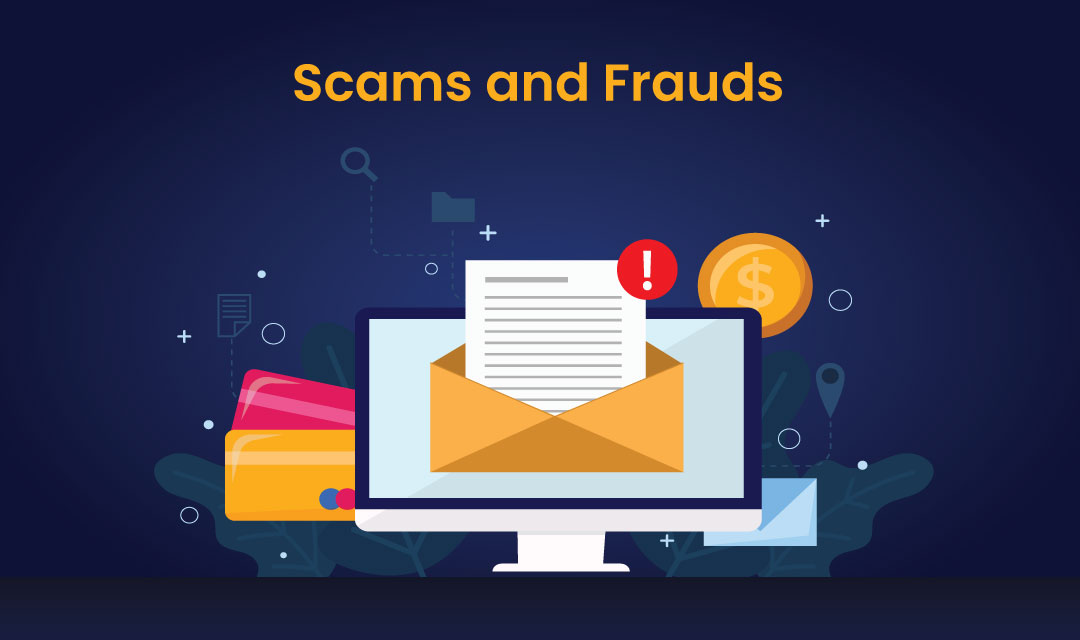Online Scams

Protect Yourself: How to detect and avoid online scams?
With prosperity of Internet, scams have become increasingly sophisticated and prevalent. From email phishing to online investment fraud, scammers are constantly devising new ways to deceive innocent individuals. To safeguard your finances and personal information, it's crucial to be aware of common scams and learn how to detect and avoid them. This article will explore some of the most popular scams and provide tips on how to protect yourself.
Phishing Scams
Phishing scams are among the most common and enduring types of online fraud. They involve scammers posing as trusted entities, such as banks, government agencies, or reputable companies, to trick you into revealing personal information, such as passwords and credit card details. To avoid falling victim to phishing scams:
- Always double-check the sender's email address and look for inconsistencies or misspellings. You may user our trace email tool to verify where the email is originated from, and identify any suspected frauds.
- Avoid clicking on suspicious links or downloading attachments from unknown sources. Use our online inspect suspicious link tool to identify where the link is destined, and preview landing page without clicking on the link.
- Use two-factor authentication (2FA) wherever possible to add an extra layer of security to your accounts.
Online Shopping Scams
With the rise of online shopping, scammers have found new ways to target consumers. They create fake online stores that mimic legitimate sites, and entice shoppers with low prices and discounts. If you purchase a merchandise on a scammed site, you become a victim of online shopping scam. To avoid online shopping scams:
- Verify the website's legitimacy by checking for secure connections (https://) and reading online reviews.
- Be cautious of deals that seem too good to be true.
- Use secure payment methods, such as credit cards, which offer fraud protection.
Investment and Ponzi Schemes
Investment scams promise high returns with low risk, but they often lead to financial fraud. Ponzi schemes involve using funds from new investors to pay returns to earlier investors. To avoid falling for investment scams:
- Conduct thorough research on the investment opportunity and the company offering it.
- Be skeptical of guaranteed or consistently high returns. If it's too good to be true, it probably is a scam.
- Seek advice from a trusted financial advisor before making any investment decisions.
Tech Support Scams
Tech support scams involve fraudsters posing as tech support agents who claim to detect problems with your computer or software. They usually claim themselves as a tech support person from Microsoft, Apple, Google, PC Manufacturer (Dell, HP, and etc.), ISPs or Antivirus software company. They then convince you to grant them remote access or pay for unnecessary services. To avoid tech support scams:
- Remember that legitimate tech support companies will not contact you unsolicited.
- Do not grant remote access to your computer unless you initiated the request and are sure of the person's credentials.
- Hang up or close the chat if you suspect a scam and report the incident to the authorities.
Romance Scams
Romance scams prey on emotions and trust, and typically start by becoming a social media friends. A scammer creates a new social media account with someone else's identity, and makes a friend request to you. Scammers build fake online relationships and eventually request money for unforseen accident or temporary relief. To protect yourself from romance scams:
- Be cautious of individuals who refuse to meet in person or make excuses.
- Never send money to someone you haven't met in person.
- Report suspicious activity to the dating website or social media platform if you suspect a scam.
Conclusion
Scams are a pervasive threat in online community, but you can protect yourself from falling victim with awareness and vigilance. Always verify the legitimacy of offers and requests for personal information, and remember that if something seems too good to be true, it probably is. By staying informed and cautious, you can significantly reduce the risk of becoming a victim of popular scams and safeguard your financial well-being and personal data.

April 18, 2023
What is a BEC Scam?
Business email compromise (BEC) scams are a type of fraud in which attackers gain access to an email account belonging to an individual who has control over financials and use it to scam the company or its clients out of money. Scammers use phishing or social engineering tactics to trick victims into entering email credentials on a fake login page.
Learn more
May 31, 2019
How to Stay Safe from Online Scams?
The Internet is the common place where scammers are seeking innocent users. Scammers are using every tactic to trick users into obtaining personal info and asking them for money. They employ a series of different tricks to mislead people through social engineering or even fool them into a false sense of security. Learn how you can identify and prevent online scams.
Learn more
January 12, 2023
How to avoid getting scammed on Craigslist?
Craigslist is a "free" classified advertisement platform widely used to buy and sell products, post job opportunities, and offer rental properties and local services. It is one of the most widely used platform scammers use to scam innocent users. How do you identify and prevent Craigslist scams?
Learn more
March 4, 2021
How to detect Email Scams?
An email is the easiest way for scammers to mass distribute fraudulent messages to people, and it takes very minimal effort on their part. Email service providers such as Gmail, Hotmail, and Yahoo! do their due diligence and filter all suspicious emails but scammers are finding new ways to bypass such filters. As an Internet user, it is our responsibility to identify and avoid them.
Learn more